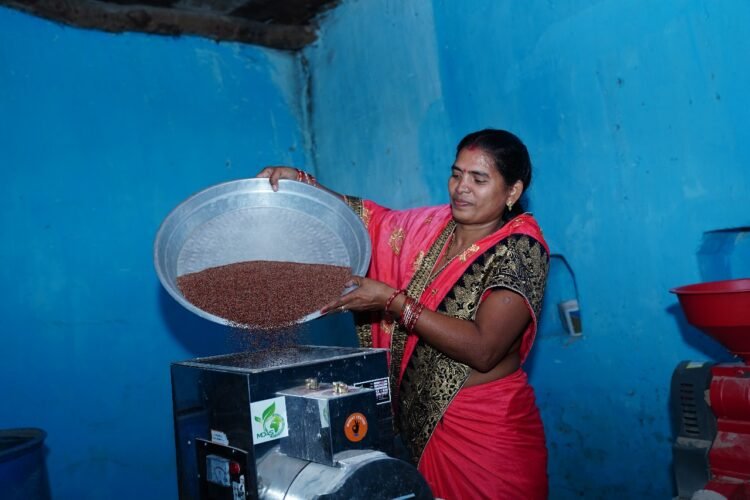With newly gained skills and knowledge, Jyotsnarani established “Swagat Food Product,” a thriving enterprise in the food processing sector
BHUBANESWAR, Odisha (India CSR): The food processing industry in India holds a prominent position, accounting for around 9-10% to India’s GDP. It is the fifth largest sector in terms of production, consumption, export, and expected growth. Micro entrepreneurs form a crucial part of this sector, fuelling economic growth, generating employment, and fostering entrepreneurship development. Engaged in diverse ventures such as traditional snacks, pickles, sauces, sweets, spices, and value-added food products, they provide livelihoods to millions, including women and marginalized communities.
From Homemaker to Food Processing Entrepreneur: Jyotsnarani Mohapatra’s Journey
One such entrepreneur in the food processing sector is Jyotsnarani Mohapatra, a resident of Khordha district in Odisha. Jyotsnarani was a homemaker, and her husband was engaged in some minor activities related to selling of cereals to local millers. Her family used to cultivate cereals but there was no value addition to it, and hence could not earn much from it apart from a few thousands. Driven by the desire to enhance her income and secure a brighter future for her two children – a girl and a boy, Jyotsnarani wished to establish an enterprise beyond the limitations of traditional cereal trading. However, she lacked the necessary entrepreneurial skills and resources to execute her idea.
Empowerment Through the Swakalpa Program
Once she joined the Swakalpa Program, she received invaluable guidance and mentorship support about setting up a food processing business. She was provided with extensive legal support for registration of her business, Udyam Aadhar registration and then obtaining a FSSAI license. With newly gained skills and knowledge, Jyotsnarani established “Swagat Food Product,” a thriving enterprise in the food processing sector. Swakalpa team also guided her in business planning and obtaining credit access, by supporting her in preparing a robust business proposal. Due to these efforts, Jyotsnarani secured a loan sanction of INR 50,000 from State Bank of India (SBI) through PM MUDRA scheme for enhancing the operational efficiency of her enterprise.
Sustained Support and Brand Development
But Swakalpa program’s positive influence on the business didn’t end here. Jyotsnarani received further support from the program in formulating brand strategies, logo designs, sustainable packaging, and product development. Swakalpa also facilitated market linkages through exhibitions and tie ups with wholesale shops ensuring broader reach of her products. Now efforts are underway to onboard the business on e-commerce platforms like Divavi – Gaon ka Bazar and facilitate online payment mechanism through Bharat Pe for seamless e-payment solutions.
Achieving Financial Success and Community Impact
Today, Jyotsnarani’s venture boasts of monthly revenue of about INR 1.5 lacs, with a profit of INR 25,000 per month for the last two months, projecting an impressive potential of revenue around INR 5 LPA by the time the business completes one year. Not only has she achieved financial success, but she has also created employment opportunities for three individuals within her community. Serving more than 1,500 customers each month, her business has garnered significant attention for its quality and popularity reaching districts like Cuttack, Nayagarh, and Puri. Swakalpa is helping her and many such nano business owners in their journey to grow into potential bigger enterprises.
Vision and Goals of the Swakalpa Program
Talking about the Swakalpa program, Pinaki Patnaik, COO, World Skill Center says, “The vision is to empower a generation of nano-entrepreneurs in Odisha through Swakalpa. This initiative aims to empower 10,000 youth with self-employment and entrepreneurship skills, establishing 1,000 micro-businesses with a special focus on women entrepreneurs. Through 100 hours of training and 6 months of personalized mentorship, Swakalpa is unlocking the full potential of these businesses and help them scale. We aspire to cultivate a dynamic ecosystem where small businesses flourish, contributing to the broader socio-economic prosperity of our community.”
(India CSR)






















